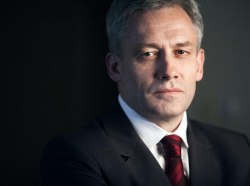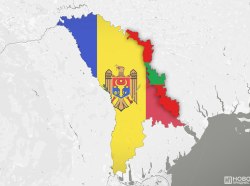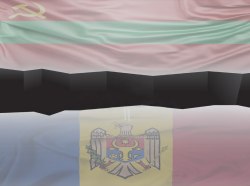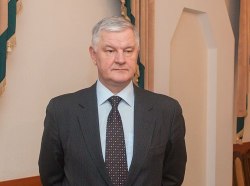Overdue conversation
The need for the continuation of the negations at the level of the «Permanent conference…», also known as «5+2» format, has recently become a central topic in discussions regarding the immediate prospects of the Moldo-Pridnestrovian settlement.
The last «5+2» meeting took place in Berlin in June 2016, after which the negotiating process stalled at nearly all levels, showing disappointing performance both in terms of dynamics and results. For more than six months Kishinev regularly avoided contact with Tiraspol representatives, explaining it by electoral processes in Pridnestrovie and Moldova, and against this backdrop imposed new restrictions on Pridnestrovie in the sphere of railway communication, using as a smokescreen media leaks about the elaboration of a new «concept of Pridnestrovie's status as part of Moldova».
Tiraspol, in turn, regularly called the opponents for a dialogue and proposed drafts of concrete solutions in various spheres. Besides, there has been the Berlin protocol on the agenda, with only one of its seven provisions being executed so far. In other words, there were a sufficient number of topics for discussion in the «5+2» format, many of which were quite solvable, but «Permanent conference…» meetings had not been resumed until the end of 2016 for the above-mentioned reason. When signing the Berlin protocol, Moldova apparently made an unprecedented compromise with common sense and, therefore, immediately tried to compensate the demonstrated «ability» for a refusal to comply with the document.
In the new year, after all formal reasons to avoid talks were exhausted, Kishinev changed its tactics and also began to express readiness for a «5+2» meeting, understanding that the blocking of the negotiating process is unlikely to suit the new Austria's OSCE chairmanship, which may even heed Pridnestrovie's repeated signals about Moldova's reluctance to dialogue. Moldova was not going to confirm that Tiraspol was right, and during his very first meeting this year with Pridnestrovie's foreign minister Vitaly Ignatyev, Moldova's chief negotiator Gheorghe Bălan publicly spoke in favour of the early conduct of a «Permanent conference…» meeting.
Mediator's deliberateness
However, even in a situation where both sides have argued in favour of continuing the negotiations, the Austrian OSCE chairmanship itself does not seem to be quite ready to conduct the long-awaited meeting.
So, OSCE chairman-in-office Wolf Dietrich Heim, who visited Kishinev and Tiraspol in January, made very vague statements about the timing of the next «5+2» round, noting that «meetings for the meetings' sake» do not suit Austria and that meetings at such a level should be held only after the sides have managed to agree on something in advance. However, the Austrian diplomat also mentioned «more than two «Permanent conference…» meetings in 2017 which are likely to take place in Vienna, but avoided specifics.
Following his special representative, Austria's foreign minister Sebastian Kurz also visited Pridnestrovie and Moldova and made even more careful comments. He spoke about the need to solve problems in relations between Pridnestrovie and Moldova, developing Germany's success achieved in 2016, but also made it clear that Vienna is ready to conduct «5+2» meetings only if the sides have worked out concrete agreements. «The results are necessary to create conditions for the next meeting in the '5+2' format," the official OSCE press release quotes Kurz as saying.
Austria's stance has raised quite well-grounded questions in expert and diplomatic circles — in fact, the OSCE as a negotiation mediator should welcome and encourage the sides' initiatives to hold «5+2» meetings but certainly without setting preconditions for negotiations.
Thus, Russia's ambassador at large Sergey Gubarev, representing Moscow in the negotiating process, directly stated during his meeting with Vitaly Ignatyev that he did not share the position of the Austrian colleagues that «each meeting should end with specific, 'palpable' result», adding that if it were real, the negotiations would not last so long.
Speaking to the press back then, the Russian diplomat recalled one obvious but almost forgotten idea that «negations is quite unspectacular and routine work rather than the circus, theatre or an action film», saying it was the first time when the common willingness of Tiraspol and Kishinev to resume the work of the «Permanent conference…» does not meet response from the current OSCE chairmanship.
One can also add that if Moldova and Pridnestrovie could efficiently agree at the bilateral level, there would be no need for mediators and the international format would lose its meaning.
Playing with fire
A question arises: why stall the dialogue between Kishinev and Tiraspol after several long and sensitive intervals in the Moldo-Pridnestrovian settlement?
It is evident that the «5+2» format alone is influential and relevant only when it steadily functions, i.e. provides the conflict sides with a venue for peaceful dialogue. In addition, the «Permanent conference…» is really a unique venue for international dialogue to settle the conflict when relations between the sides are very tense. The expert community has said for many years that the lack of dialogue in the «5+2» format only provokes Moldova's unilateral actions against Pridnestrovie, due to which the entire negotiating process is discredited and each time its «restart» gets only harder. Holding «5+2» meetings has, on the contrary, a tangible positive effect — the presence of international participants at the negotiating table disciplines the conflicting sides since it is extremely difficult to juggle facts, substitute notions and «refuse» its own unilateral actions against the opponent in the face of mediators and observers.
One should remember that the «5+2» format also retains its unique geopolitical meaning. Today it is one of few venues where representatives of Russia, Ukraine, the EU, OSCE and USA can interact. It is no accident that in 2016 some experts noted that it is the process of Moldo-Pridnestrovian settlement that may become a platform for normalising contacts between Russia and the EU, including on issues not directly related to Pridnestrovie and Moldova.
It seems that some international negotiation participants are deliberately delaying the conduct of another round of negotiations because Pridnestrovie's current position in the dialogue with Moldova is rather strong — Tiraspol has long proposed draft solutions to a large number of problems in relations between Pridnestrovie and Moldova, employing the judgement and opinion of international experts. And if Kishinev can sidestep considering such initiatives at the bilateral level, at a meeting in a wide format the Pridnestrovian proposals have good prospects for approval.
If this assumption is true, it turns out then that someone of the international mediators is explicitly playing into Kishinev's hand, deliberately using the stalling of the work of the «5+2» format to enable Moldova to prolong pressure on Pridnestrovie to impose on Pridnestrovie disadvantageous conditions of solving acute problems.
Perhaps, it is not so difficult as it seems and in the current year the Austrian OSCE chairmanship will simply try to avoid potentially no-win scenarios as «Permanent conference…» meetings rarely ended with the above-mentioned «palpable» success. In this sense, Austrian diplomats believe it is possible to hold a kind of «ritual» meetings only when they will bring maximum PR points to both Austria and personally Sebastian Kurz. This is an obvious approach from the point of view of the political relations that has given Mr Kurz a start in big diplomacy.
Be that as it may, all possible causes of inefficiency in the work of the «Permanent conference…» meet the interests of certain players, but, in general, harm the very «5+2» format, threatening its functionality and relevance. The less the work of the international «5+2» mechanism meets the expectations of the citizens of Moldova and Pridnestrovie, the more it erodes its instruments and the less successful the negotiating process becomes.
As a result of this deliberate stalling, a moment may come when the participants of the negotiating format will lose trust in it. Will a real alternative to the peaceful negotiating process be created by this moment? It is known that in a conflict situation the breakdown in negotiations inevitably leads to growth in contradictions and the escalation of tensions between the sides. Are those who are suppressing negotiating impulses today responsible for the further expansion of the conflict? There are many questions, and all of them remain open.
What to do?
It is suggested that the intensification of the «5+2» format today as before is the best option to maintain stability and coherence in the process of settling Moldo-Pridnestrovian relations. Holding a regular «5+2» meeting would not only remove speculations about the possible existence of the negotiating process in the present configuration, but it would enable a wide range of international representatives to find out the real attitude of all the participants towards the goals and objectives of the «Permanent conference…», as well as Kishinev's readiness to come to agreement with Pridnestrovie on something specific.
Otherwise, the year 2017, called by many «a window of opportunities, risks becoming «the year of closed doors» and a period of further growth of tensions both on the Dniester banks and across the entire region.
Source: Russian Planet








